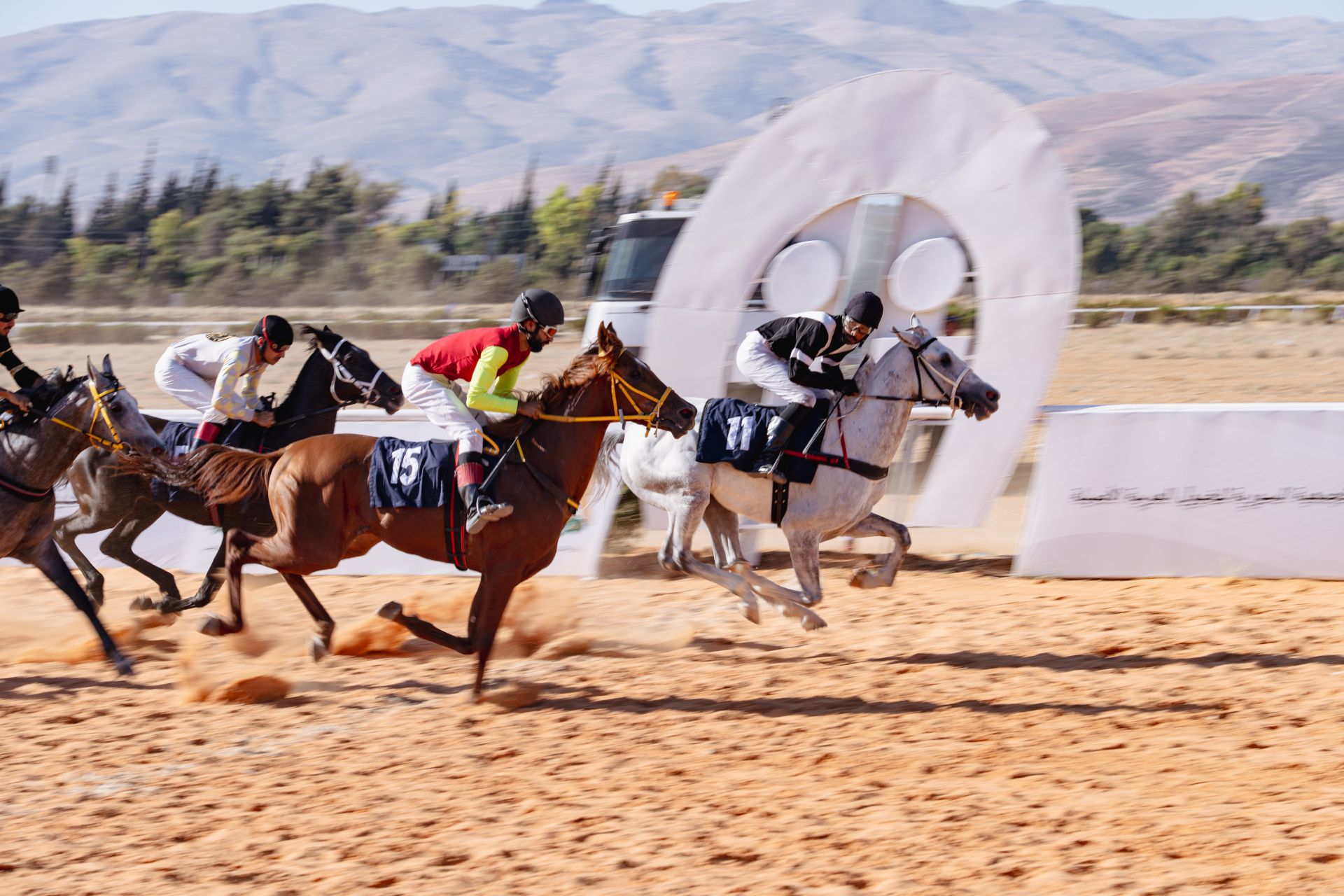At the al-Kalawi stables, on the western edge of Damascus, impatient neighs echo from the stalls. Grooms lead out horses with braided manes, preparing for only the second horse race organized in Damascus — and the fourth in all of Syria — since the fall of the Bashar al-Assad regime in December. “We’re starting from scratch. It is slow, but the machine is running again,” rejoices Ayman Dahab, a breeder at al-Kalawi.
Half an hour before the race begins, Mustapha Abu Adi, a stable hand, gently brushes Ghazal, a silver-coated mare. He runs his hand over the horse’s powerful muscles, built during months of training.
Hooves strike the ground. Across the stable, Mahmoud Sabah, a 23-year-old jockey, locks eyes with the horse he is about to ride, Yaqout. For a moment, it feels like they are speaking to each other — he is counting on the animal to win. A Palestinian Syrian from Hama, a jockey since 2020, Sabah returned to Syria just 10 days earlier, for the first time since Assad’s overthrow.
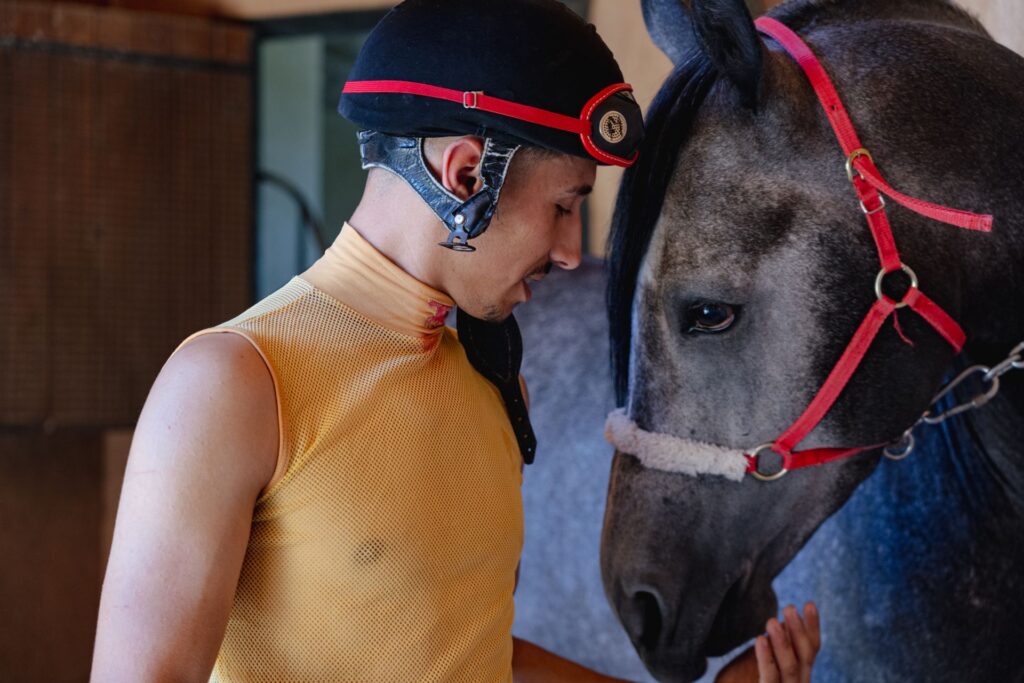
He spent the previous two years in Germany, where he sought refuge from military service under the old regime. Small, wiry and barely 5 feet, 3 inches tall — the typical build for a jockey — he trained in the stables of Duesseldorf and Cologne. “Other jockeys will return from Europe too. This is a new beginning for the racing world,” he says, patting the horse’s neck.
In the hippodrome, the stands erupt under the scorching June sun. “And they are off — 1,000 meters!” shouts the announcer. Ten Arabian purebreds surge from the starting gate.
Dozens of soldiers have been mobilized for the event’s security. Unmoved by the crowd’s fervor, they remain on high alert. “They say ministers are coming, even the children of [interim President] Ahmad al-Sharaa,” exclaims Odai, a spectator.
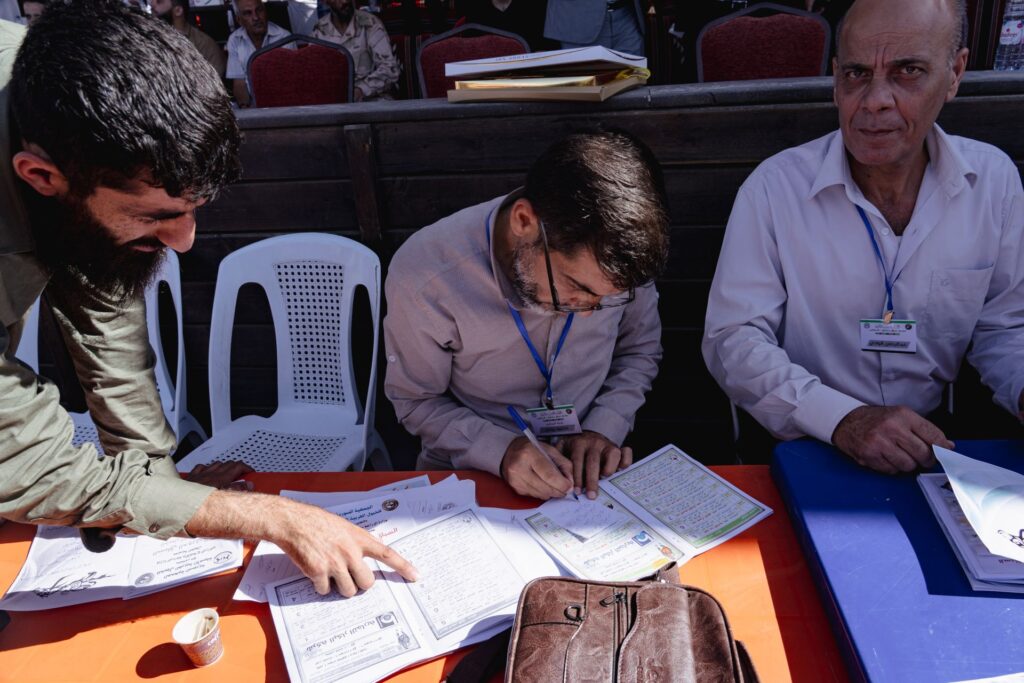
Ten races follow one another, with prizes ranging from $500 to $1,000. In the 1,500 meters, Sabah, the jockey from Hama, takes second place. The crowd storms the sandy track in a frenzy. “These races are still private initiatives,” explains Louay, who introduces himself as a fuel smuggler from Idlib and a sponsor of the event. “This one cost just over $20,000. I invested $8,000 from my own pocket,” he says, seated in the VIP section. “The state does not yet have the means to finance such events.”
In front of the stands, a jury of five judges scores the races. They belong to the Syrian Association for Arabian Horses. One of them, Taher Ghalyoun, listens to owners filing complaints about rivals’ faults after each heat. “The enthusiasm of the public proves we were right to restart,” says the horse breeder from Homs, pointing to the hundreds of spectators in the stands. “We must not give up. The Arabian horse is Syria’s soul.”
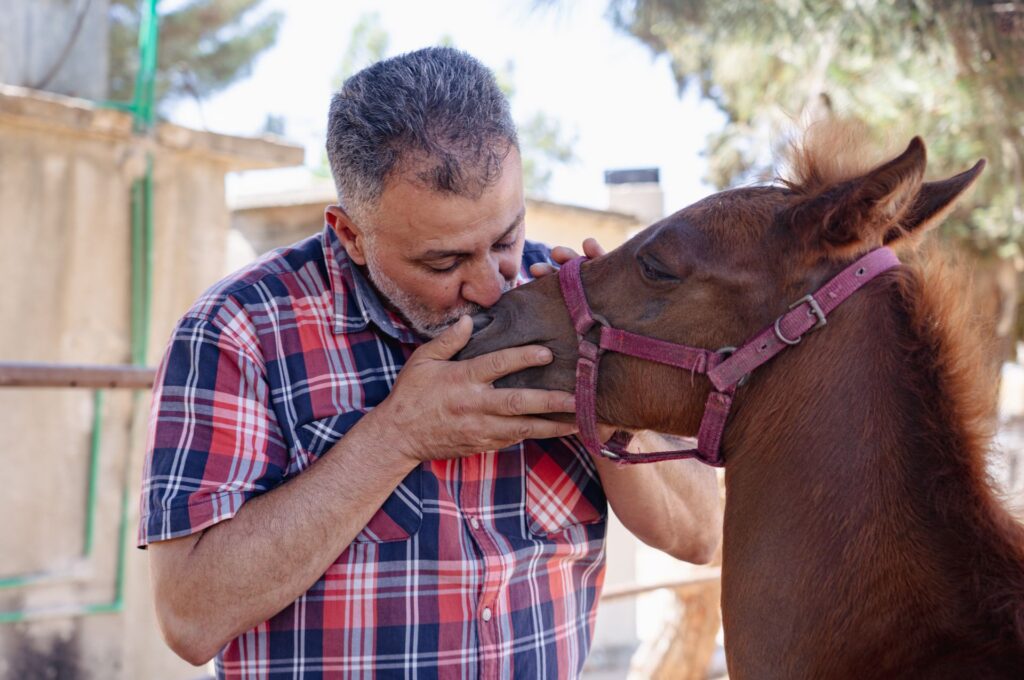
The final event, a bareback 3,000 meters, closes the day. Trainers head back to the stables. On the dusty path, a small abandoned plane lies rusting. “Maher al-Assad tried to use it to flee Syria during the regime’s collapse, but he was quickly stopped,” explains a stable hand, referring to the brother of the former president.
In the stables, veterinarian Yasser Hindi examines the sweating horses. “I look at their eyes, check if they are hydrated,” says the man, who has worked in the field for 26 years. “Today, because of the economic crisis, we cannot buy all the medicines our animals need, like anti-inflammatories and antibiotics from Europe. It is also sometimes difficult to feed them properly, since Arabian horses require imported protein supplements.” Each purebred costs its owners around $1,000 a month to maintain.
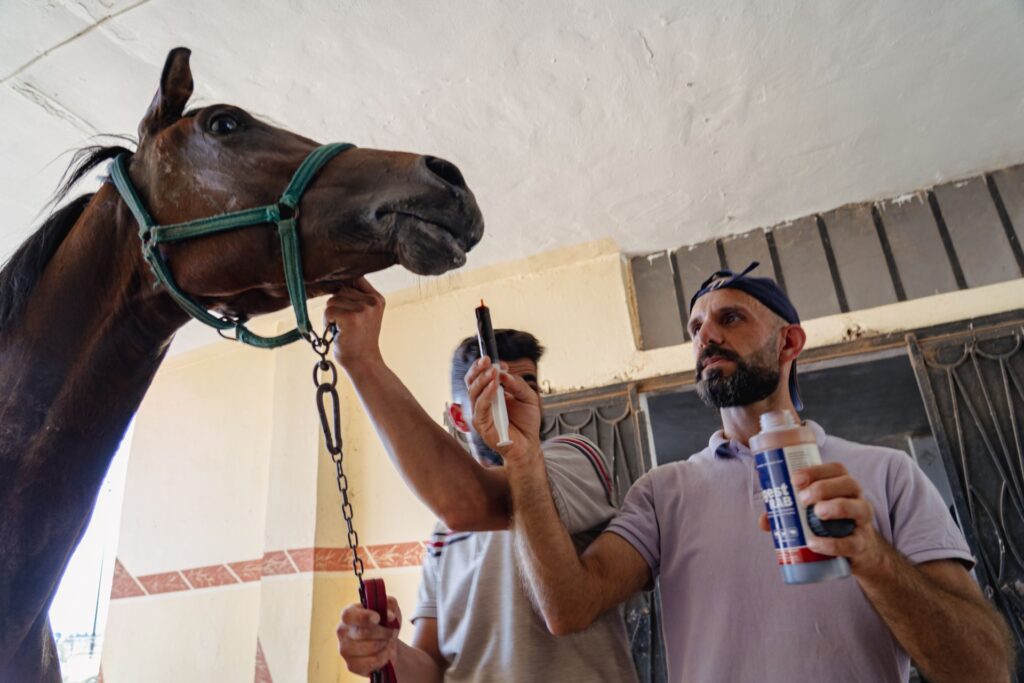
Nearby, a miniature model of a vast hippodrome sits on display. “We had planned to build this when we were in exile,” explains Dahab, the purebred breeder, who is also a former Free Syrian Army fighter who fled to Germany more than seven years ago. He returned to Syria in December, after the regime’s fall, to dedicate himself to his horses. “Thanks to the regime’s downfall, we will finally be able to realize this dream here. The hippodrome is under renovation,” he says, pointing to the new stables being built.
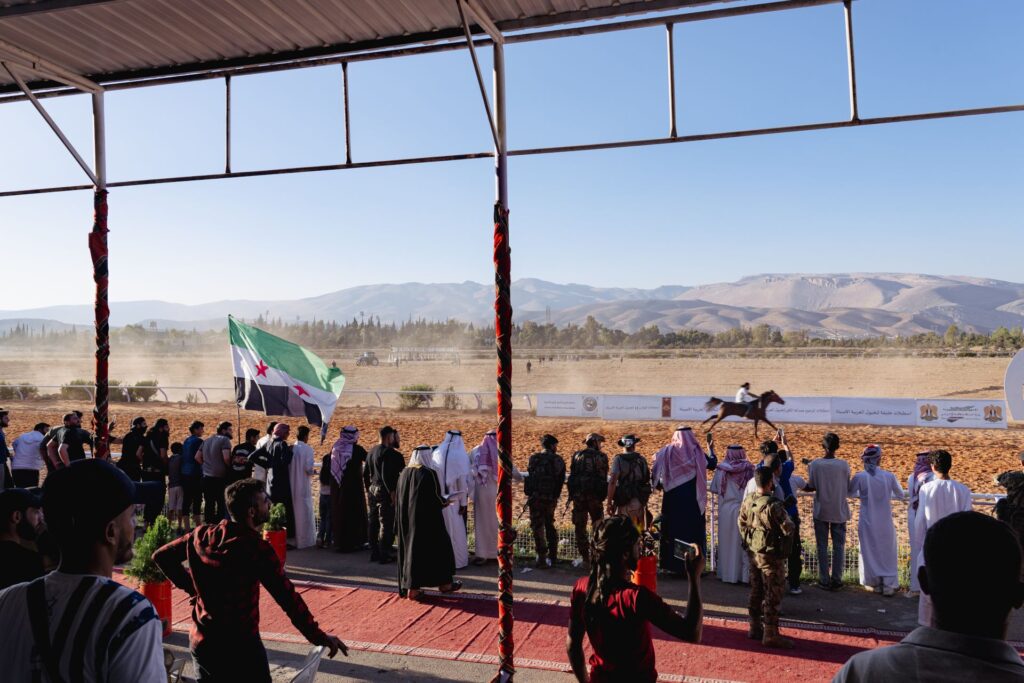
Opposite the hippodrome, next to a former military intelligence base, the al-Rimaya club has taken on a new aspect in recent weeks. “We began renovations about six weeks ago,” says Abo Zed, the club’s president. Around the sand-filled arena, gardeners are laying fresh grass and colorful flowers.
In his office decorated with wooden horses, Zed exchanges his daily T-shirt and sneakers — better suited to the June heat — for a suit and polished shoes. “The club was abandoned for years,” he says. “Assad had no respect for life, so how could he respect horses?”
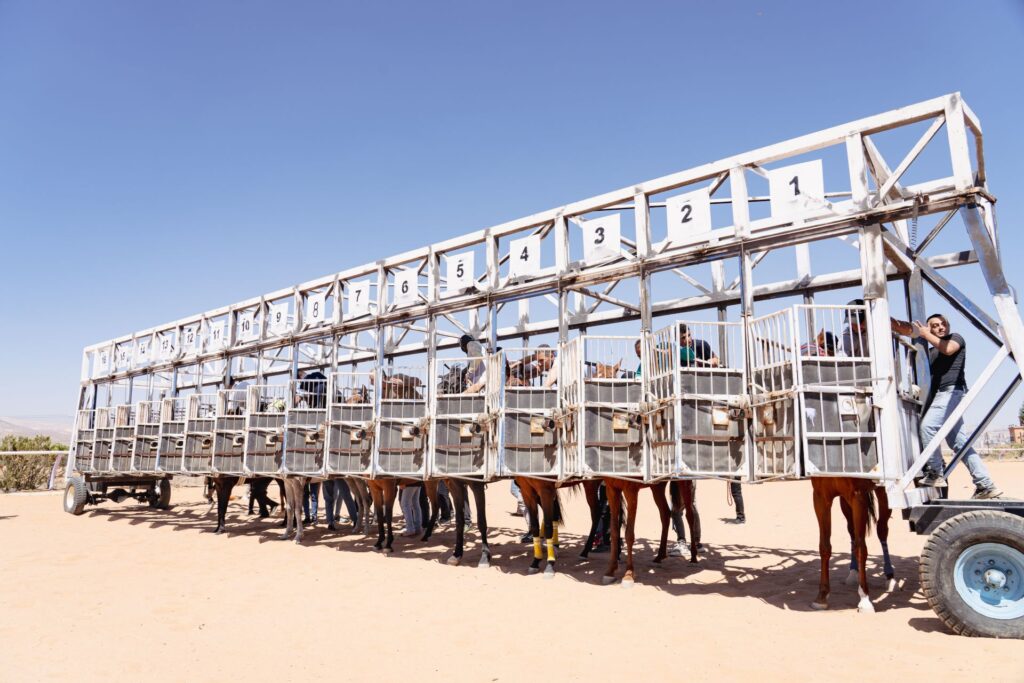
Originally from Hama, Zed lived through the Syrian war in Idlib, where he fought with Hayat Tahrir al-Sham. After the regime’s collapse, he was appointed president of the club. Al-Rimaya is Syria’s largest equestrian center, with 160 European horses and 80 Arabians, including 15 foals. It is also the best-maintained club in the country. A government club, it aims to showcase Syria’s equestrian world.
“President al-Sharaa invests his own money in the club,” says Zed, without specifying how much. “He has a real passion for horses,” he insists, showing a photo of himself with al-Sharaa riding a stallion. Yet despite the president’s support, “we’re starting from zero,” says Zed. “Before, the Assad regime lived off Captagon and dirty trafficking. Now that’s over. We must rebuild the economy so the equestrian world can live again.”
Since the new government took office at the end of March, sports and youth ministry representatives “have still not visited the club,” Zed notes. Still, he remains optimistic: “Under Assad, there was no ministry of sports, no real government policy. Decisions were taken arbitrarily by regime associates through the Syrian Arab Equestrian Federation. Now we want to build a vision for the equestrian sector. But we will need funding.”
Though neglected during the conflict, the al-Rimaya club and its grounds were never bombed and suffered no damage. In December, however, amid the chaos of the regime’s collapse, “dozens of horses were stolen,” recalls Ali, a professional show jumper. “Mostly European ones. The Arabians were spared because they have specific tattoos that make them easier to identify.”
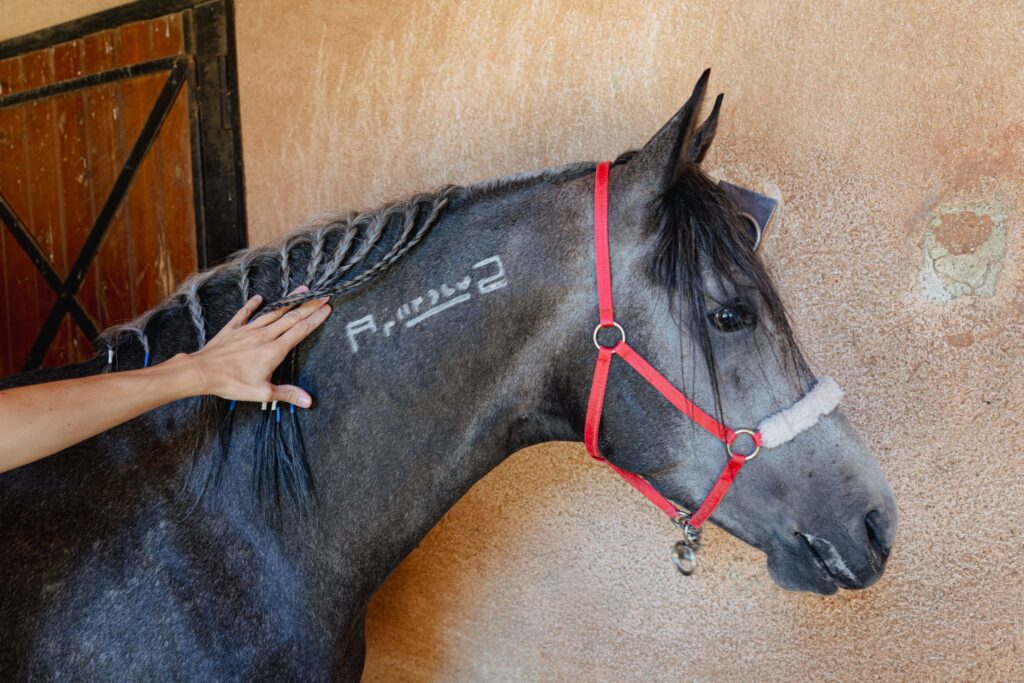
Club regulars joined in the search. “Ayman Dahab even went to Lebanon to find a stolen horse,” Ali says. “What’s terrible is that the thieves did not know what they were doing. The horses were injured because they were forced to march long distances on concrete.” Two European horses are still missing.
In the stables, Zed inspects the stud, addressing the stable hands with a military tone. “Bring out that filly,” he orders. Abud (name changed), a show-jumping trainer with more than 20 years’ experience, watches warily. “The management is strict. We are never thanked for our work. It is not right,” he complains. His friend Ahmad (name also changed) interrupts: “Careful, be quiet.” A few yards away, Dahab watches young riders train. The club gathers returnees alongside both those who never left but kept their distance from politics, and former regime loyalists.
“The atmosphere is strange. We know Ahmad Hamcho, who sometimes trains here, was very close to the Assads,” explains Sarah, a member. “But then you also have Ayman Dahab, who comes every day. He fought in the opposition — he’s a hero! Somehow, for reasons I do not quite understand, it works. Maybe it is because, deep down, we Syrians are used to not talking too much about sensitive issues.”
It was at al-Rimaya that Maher al-Assad’s daughters used to train before the regime’s fall. Sham and Bushra were regulars in national and international show-jumping competitions. “They were privileged. With money from corruption and their connections, they could buy the best trainers and horses,” explains Luna (name changed at her request). “At competitions, there were no surprises — it was almost always Assad’s relatives who won.”
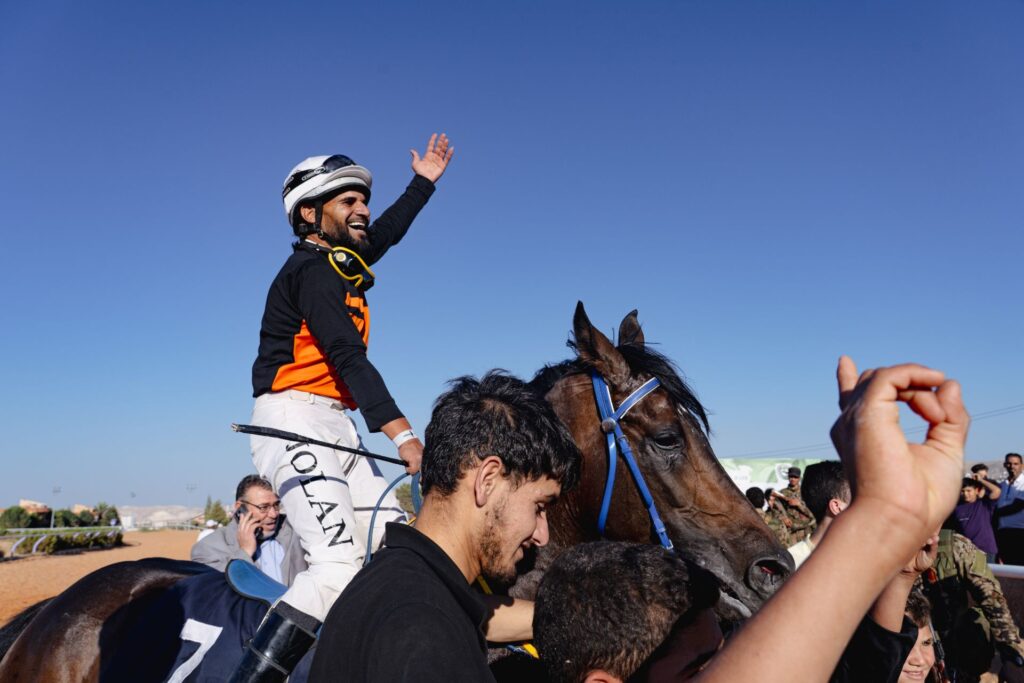
At the arena entrance, Zed’s son mounts a mare prepared by a stable hand. “I used to ride in Idlib, but I started again when we moved to Damascus. At the last competition, I jumped 4 feet, 3 inches,” boasts the boy, a slim and red-haired 16-year-old. At al-Rimaya, the passion for horses remains a family affair, even after Assad’s fall.
The involvement of Assad’s relatives is well known to Firas (name changed at his request), who comes from a family of horse breeders with a tradition spanning 300 years. He carried on the family trade until he sought refuge in Europe in 2013, when persecution of revolutionaries intensified. Though he has rebuilt his life far from Syria’s turmoil, he closely follows developments in the local equestrian world since the regime’s fall. He tracks who competes in national and international competitions, whether they were tied to the Assad clan, and who is buying the horses.
For him, the shadow of Assad still hangs over Syria’s small equestrian scene. “Too many trainers and riders are still the same people who served under Bashar. To us, they are madmen. They did everything to get us pushed out of the national team, accusing us of siding with the revolution. There are at least 200 Syrian riders in Europe ready to replace them,” Firas says over the phone. “I had high hopes when the regime fell, but today I am disillusioned. We need a new equestrian federation so we can start again on a clean foundation. But more than six months after the rebels took power, nothing has been done.”
For Firas and anyone interested in horses, one story sums up the Assad clan’s grip on the sport. In the 1980s and ’90s, Adnan Qassar was a distinguished show jumper who competed alongside his “friend” Bassel al-Assad, Hafez al-Assad’s eldest son and heir apparent.
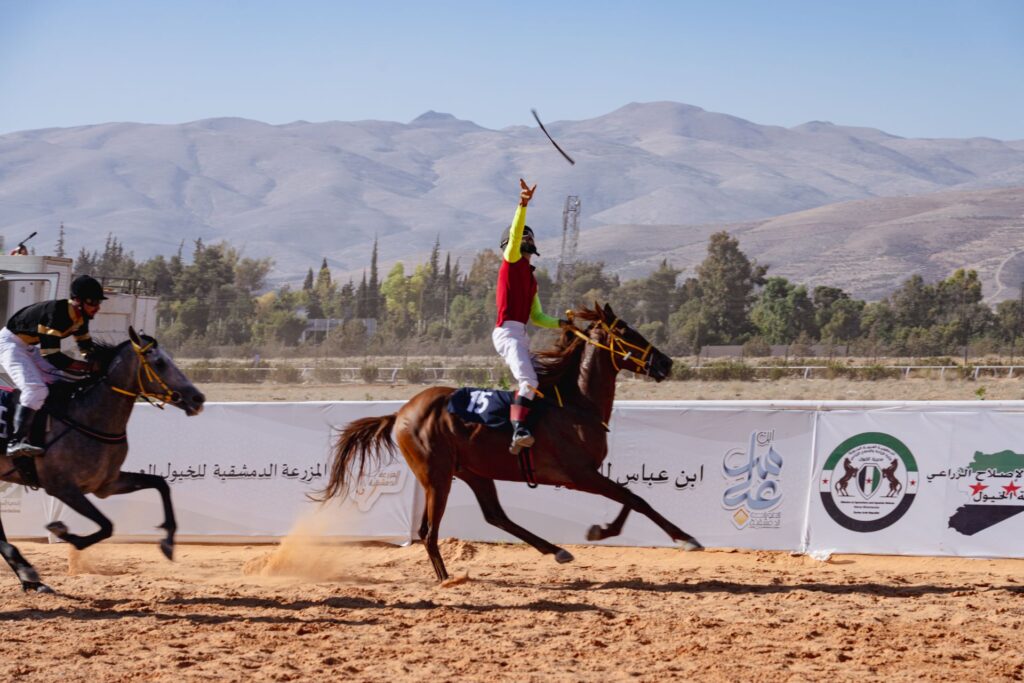
In 1993, during the international equestrian championship in Latakia, Qassar made the mistake of finishing ahead of Bassel, allowing his team to win. “Bassel’s jealousy destroyed Adnan Qassar’s life,” recalls sports journalist Kamal Orwa Abo.
Enraged at his defeat, Bassel had Qassar arrested, accusing him of involvement in a car bomb assassination attempt. Qassar was sent to military intelligence, kept for six months in a basement and regularly tortured. Without trial, he was then transferred to the prisons of Sednaya and Palmyra. In total, he served 23 years and was only released in 2016. Bassel, meanwhile, died in a car accident in 1994, a year after Qassar’s arrest. “Everyone knew no journalist could ever touch the issue of corruption in equestrian sport, or ask why only riders from the army and police clubs, or those from elite families close to power, received media attention and support,” Abo says. “No one dared open the file of Adnan Qassar.”
At Aleppo’s riding club, the contrast with Damascus is stark. The freshly laid grass and automatic sprinklers of the capital’s club are replaced by a simple sandy track, surrounded by stands half-destroyed by bombing. In the old arena, a child on horseback, guided by his father, trains by climbing piles of rubble reduced to dust — what were once spectator stands.
“In Damascus, the war didn’t affect the equestrian infrastructure. Here, everything was destroyed. Just look at what the Assad regime did to Aleppo’s souk. Before the war, the club was a little paradise,” recalls Bassam Bayram, a man in his 50s with a thick black mustache. A former professional show jumper, he has frequented the “nadi” (“club” in Arabic) since 1975.
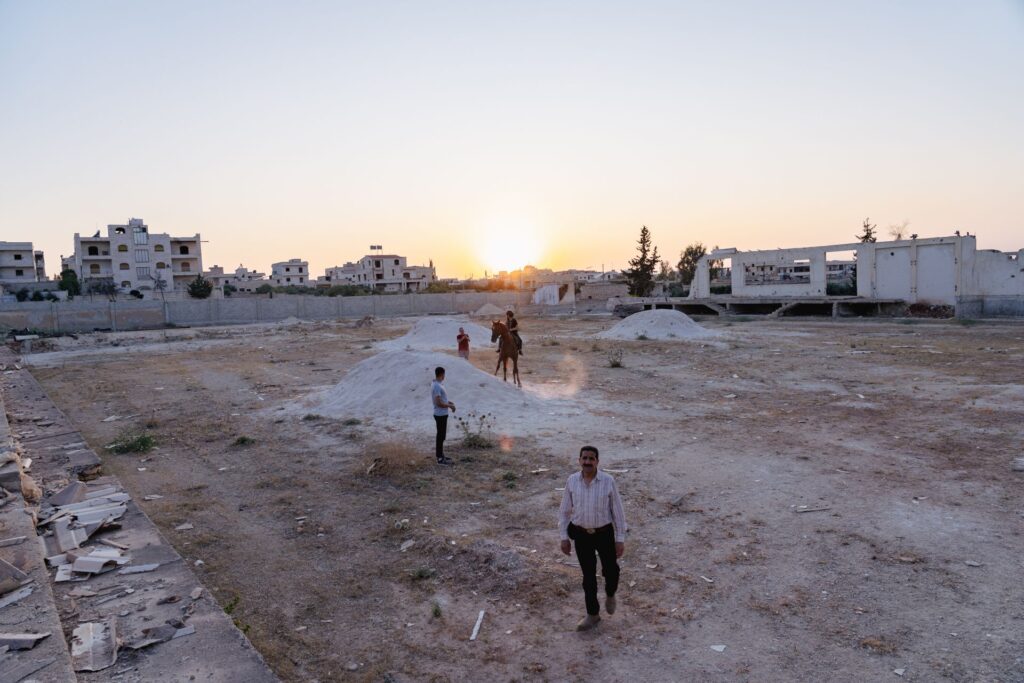
Like all other members, he left the club in 2012, when fighting intensified between rebels, who took the east, and Assad’s government forces in the west. Of the 60 horses at the club, 50 were moved to safer areas or to Damascus. At great personal risk, a veterinarian and a groom regularly traveled back and forth to care for the remaining horses.
“We did not return until last year. It was too dangerous. When you hear constant shelling, when you can die at any moment, horses become secondary,” Bayram explains, leaning on the arena railing, where a few riders warm up their horses.
According to the World Arabian Horse Organization (WAHO), which registers purebred Arabians, of the 8,500 Arabians registered in Syria in 2011, 3,000 had died by 2019 — some killed in bombings, others from hunger or lack of medicine.
Harout Bardakji is the president of the club. He took office last year. Born in Aleppo to an Armenian family that arrived in Syria in 1915, he caught the horse bug from his uncle. Since Assad’s fall, his goals have been clear. “We have already renovated one of the two stables. The second still needs finishing,” he explains, walking between the stalls. “Our priorities are to renew infrastructure and ensure a stable electricity and water supply. There are still obstacles that hinder horse training. Once that is done, we can train new generations of riders and compete, as before.”
South of Aleppo, the road to Baba Amr, a suburb of Homs about 100 miles north of Damascus, resembles the set of a postapocalyptic film. On either side of the highway, gutted apartment blocks and demolished shopping centers stretch as far as the eye can see.
“This was the main rebel stronghold. The regime left them no chance,” says Taher Ghalyoun, the judge from the Damascus race, as we travel toward his equestrian center. “People lived like the walking dead. I don’t remember seeing a smile in 14 years.”
The district was targeted relentlessly from 2011 until the rebel bastion fell in 2012, after months of siege. Like Aleppo, Baba Amr’s equestrian club did not escape unscathed. “We left in 2011 and only returned in 2017,” Ghalyoun says. “The army was still everywhere. We do not know what happened before that. When we came back, there were no horses left. Some had been sent to Damascus, some stolen, some killed in the bombings.”
He now divides his time between a kebab restaurant he runs with his brother in the city center and the riding club. He comes from a centuries-old family of breeders, and 40 of his relatives have died or gone missing since the war began in 2011.
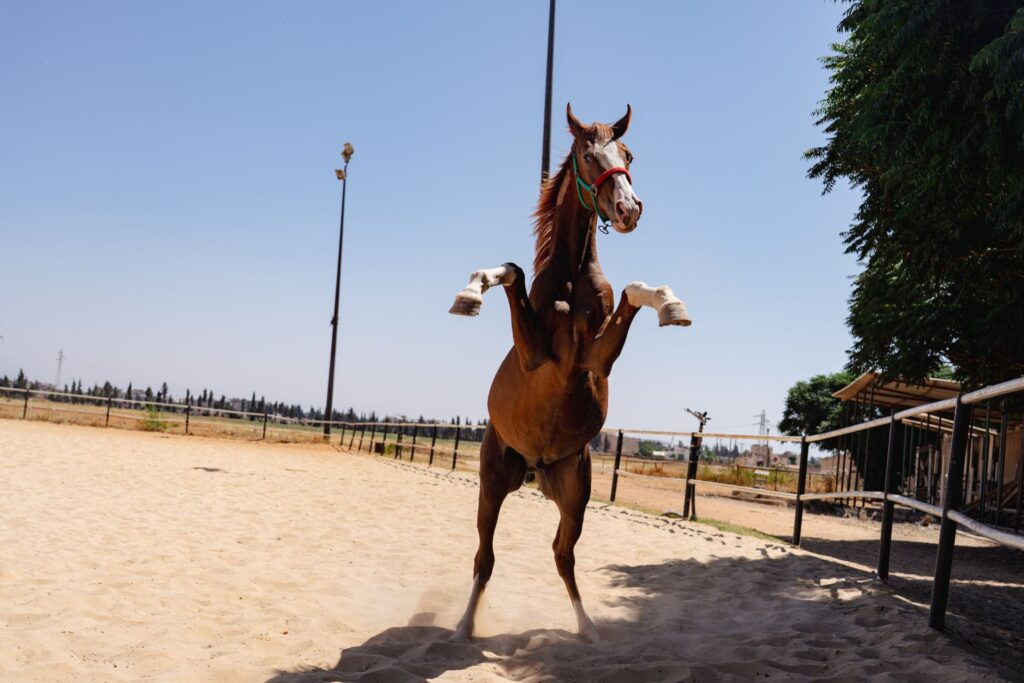
“The horse is in Syria’s DNA. It is like the ruins of Palmyra or the Eiffel Tower in France. It should be on our flag,” he adds.
Despite sanctions and wartime hardships, Ghalyoun, who says he “has Arabian horses in his blood,” has never abandoned his passion. “We always stayed in touch with WAHO, the international organization for Arabian horses. This is crucial. When a foal is born, you need to register it as a purebred. We cannot do it alone. For each birth, we send strands of the foal’s mane and that of its parents to prove it’s Arabian. It gets recorded in the horses’ genealogy.”
At the Homs club, everyone dreams of a fresh start. They remember the days before the war, when race winners could win a new car, and major companies sponsored events. “Back then, horse care was much cheaper. Today, maintaining a horse costs at least $500 per month — hooves, food, vitamins — and the prize is only $1,000?” Taher wonders aloud.
Like everyone in Syria, the owners of the club hope that the lifting of U.S. and EU sanctions will help revive the country’s economy and allow the equestrian world to recover.
Seated in the shade on a terrace overlooking the club’s vast grounds, Ghalyoun imagines a better future with relatives. “Behind that wall, we could build 40 to 50 stalls. Here, an investor could even construct football fields to rent to teams,” says Samih Ghalyoun, Taher’s cousin. Investors are not yet rushing in, but they hope that by year’s end, if the situation improves, opportunities will arise. “We have also met ambassadors from the Gulf, Qatar and Saudi Arabia. They told us they are interested in working with us. But that does not commit them to anything,” Samih adds.
Taher nods, staring into the distance. “Fourteen years of war have set Syria, and this sport, back 50 years.”
“Spotlight” is a newsletter about underreported cultural trends and news from around the world, emailed to subscribers twice a week. Sign up here.




